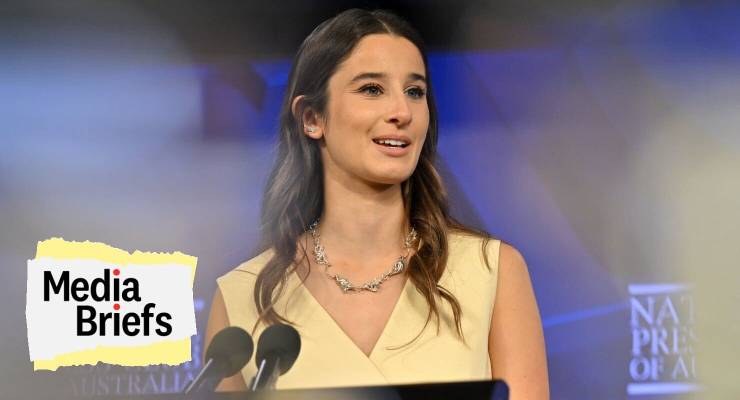
This week in the media landscape there’s a variety of controversies to choose from, with the National Press Club (NPC) seeing action overnight, as well as an incident at Guardian Australia that shows that this profession might still remain in the hands of human beings for a little while longer.
National Press Club
Sexual consent activist Chanel Contos addressed the National Press Club this week in the wake of the tragic murder of 21-year-old teacher Lilie James.
James became the fourth woman in 10 days to be allegedly killed by a man known to her, highlighting the ongoing crisis of gendered violence in Australia.
Contos called for a review of the criminal justice system, saying Australia’s conviction rates for sexual assault mean that it has “essentially (been) decriminalised”.
Asked by Cheek Media Co’s Hannah Ferguson what she thought the role of the media was in the public conversation on gendered violence, Contos said “We need to stop with the clickbait-y headlines that are basically trauma bait for someone’s travesty”, adding that James’ position as a white woman afforded her a different place in the national discourse relative to others.
This mattered not for the headline writers at the Daily Mail, who published the since-changed headline: “Sexual consent campaigner’s astonishing claim after the death of Sydney woman: ‘We can’t forget that Lilie James was a white woman’”. Good to see everyone was listening intently to Contos’ address.
Ferguson, speaking to Crikey, said the question was relevant to the NPC as she believes reporters are reluctant to shine a light on their own profession’s role in how gendered violence is covered.
“The reporters that went before me were very focused on their specific line of argument — they asked about ending rape on campus, universities, and I was like ‘no one is talking about the glaring issue’,” Ferguson said.
“We are at the National Press Club, so no one’s going to ask a question about their respective bureau or publication — but it’s the people in (that) room that can affect that change.”
Ferguson said the Australian Communications and Media Authority didn’t have adequate power to deal with “the kind of horrendous reporting we’re seeing from the Murdoch media [in particular].”
“How do we have an accountability apparatus with teeth?”
As if to prove Ferguson’s point, the dangers of artificial intelligence in journalism were laid bare this week, with an AI-generated poll on a Guardian Australia article sparking outrage and a stern response from Guardian Media Group chief executive Anna Bateson.
Microsoft’s news aggregation service published a Guardian story about James’ death and the poll, attached by the Microsoft service to the story after the fact and created by an AI program, asked readers to speculate on the mode of the 21-year-old’s death.
Bateson wrote to Microsoft president Brad Smith that the incident had caused “significant reputational damage”. A Microsoft spokesperson said in a statement that they had deactivated AI-generated polls on news articles and were investigating the root causes of the poll in question.
SBS World Cup rights
Football may not have come home for the Poms yet, but it’s coming home on our screens. SBS, which has broadcasted the FIFA World Cup in Australia since 1990, has secured the rights to the 2026 tournament, to be held across the United States, Mexico and Canada.
SBS, the incumbent rights holder, beat out increased competition from rival free-to-air networks as well as Optus Sport to lock in the broadcast rights. For the 2018 tournament, SBS licensed the rights out to Optus in a sub-licensing deal reported to be worth around $8 million, but after a problematic first week for the telco’s streaming service, stepped back in to simulcast the remainder of the tournament.
While there remains no word on any talent secured by the network for the increased 48-team tournament, football fans will doubtless be keen on the return of beloved broadcasting duo Craig Foster and Lucy Zelic.
Zelic was made redundant by the network in 2021 as part of the axing of flagship football show The World Game, while Foster left in the same year to join Nine-owned Stan Sport (who own the rights to the UEFA Champions League).
ABC vigil
A vigil was held outside the ABC’s Southbank offices to pay “proper” tribute to freelance journalist Roshdi Sarraj, killed by shrapnel from an Israeli air strike in his home in Gaza’s Tel Al-Hawa this week.
Sarraj had filed a story for 7.30 earlier in the week from Al-Shifa hospital.
While the program’s host Sarah Ferguson did “acknowledge his passing, and (sent) our condolences to his family”, the brief 15-second statement gave pause for many, with a number of people outraged at the brevity of the statement.
Campaigner and former political staffer Sally Rugg said: “‘Was killed in Gaza’ is extraordinary, deliberate language for Australia’s flagship current affairs program to use. Killed how? Killed by who?”
Organisers of the vigil said in a statement: “Having engaged Roshdi, the ABC has a duty to not pass over his death in silence. Honouring Roshdi as a Palestinian, a journalist and a human being cannot be put in the too-hard basket. All parties in this war, including the Israeli government, must be held to account and media access is crucial to ensuring that happens.”
Moves
Tracey Holmes is set to leave her role as senior reporter at ABC Sport at the end of November. Holmes took to X to note that as a veteran of 13 Olympic Games, she would not be lost to sport and intended to cover Paris 2024, just not for the national broadcaster. Holmes’ first role at the ABC was in 1989 — she was the first woman to host a national sports program, taking the helm of Grandstand in the early 1990s.
Eliza Bavin has taken over as managing editor of Nine’s crypto and future tech-focused masthead, The Chainsaw. The site launched in August last year but struggled amid the dip in the cryptocurrency hype cycle. In February this year, the outlet published a false story about a Twitter user who claimed they had fallen into a coma and lost $100,000 in the collapse of cryptocurrency exchange FTX, admitting “the entire story was a lie”.








The article is incorrect about the 2018 World Cup broadcasting rights – SBS did not “lose out to Optus”, SBS held the exclusive broadcast rights but leased them out to Optus
Good to see the insight on how the media is being called to account on how gendered violence, in part, proliferates. Time to take account!
Another aspect ignored, is how media use related (& sometime distorted) content to spook their (less mobile & rusted on) ageing audiences, along with other forms of violence, assaults and murder.
See ABC Online News Just In, seems to collate every violent incident in regional Oz, then presents it as news back to regional and urban communities, perversely almost normalising symptoms, while ignoring causes eg. patriarchy, misogyny etc. ?
The article is incorrect about the 2018 World Cup broadcasting rights – SBS did not “lose out to Optus”, SBS held the exclusive broadcast rights but leased them out to Optus, retaining some matches for itself, however when Optus’ tech failed, Optus gave the matches back to SBS to broadcast.
Reporters will hear what their readers want to hear.
“If they hadn’t believed it, they wouldn’t have seen it with their own eyes!”
Nothing is too low for those Turdoch Empire filth, it seems. If there is actually a depth to which they’ll not stoop, I reckon science would want to know about it